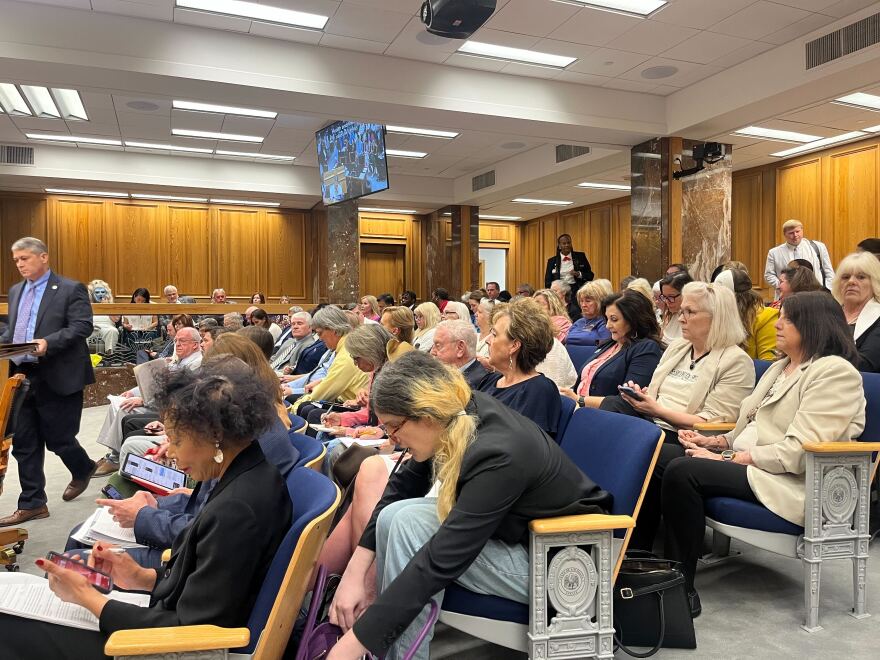A controversial bill that would have banned gender-affirming health care for youth in Louisiana died in a Senate Committee on Wednesday.
The defeat marks a significant victory for Louisiana’s transgender community and goes against a growing trend among other Republican states to restrict youth access to gender-affirming care, which often includes hormone therapy and can include reassignment surgeries.
After hours of emotional testimony and contentious debate in a packed room, the Senate Health and Welfare committee killed the bill in a narrow 5 to 4 vote mostly split along party lines.

Republican Committee Chairman Fred Mills, of Parks, joined Democrats in opposition.
The bill’s author, Rep. Michael “Gabe” Firment, R-Pollock, and other supporters repeatedly referred to gender-affirming care and surgery for transgender minors as a “mutilation” of childrens’ bodies. They also claimed these treatments are “experimental.”
“We are flying an airplane while we build the airplane,” Dr. Quentin Van Meter, a pediatric endocrinologist from Atlanta, said.
Proponents of the bill emphasized childrens’ inability to make significant life decisions and pointed out that there are some things minors cannot do, like purchase alcohol or get a tattoo.
The bill’s supporters also rejected the notion that banning gender-affirming care would lead to worse mental health conditions for minors.
Firment argued children who want to transition would be best served by compassionate mental health care. He claimed their confusion will naturally desist with mental health care and counseling.
But opponents of the bill, including health care providers, said that access to gender-affirming care improves mental health. They noted that less than 1% of people regret transitioning, according to multiple studies.
Dr. Clifton Mixon, a Louisiana psychologist who works with trans youth in the state, rebuked the idea that doctors are mutilating childrens’ genitalia. In his testimony, he also pointed out how rarely these procedures occur in the state: From 2017 to 2021, there weren’t any gender-affirming surgical procedures performed on minors in Louisiana, according to a Louisiana Department of Health study published in 2022.
Health care providers exhaust all other options, including psychotherapy and psychiatric medication, before prescribing hormone therapy, and individuals who are prescribed gender-affirming medicine experience improved mental health, according to Mixon.
“When you prescribe hormone therapies to these kids, they get better,” he said. “They stop cutting. They want to live. They go to school. They get better grades. Their relationships improve, and they can begin to live a more normal teenage life.”
Most major medical associations, including the American Academy of Pediatrics, support gender-affirming care.
“They’re life-saving, and we already know that they’re effective,” Olivia Gowan, a transgender woman, said about gender-affirming treatment to the committee Wednesday.
Still, Firment said puberty and hormone blockers are not FDA-approved for treating gender dysphoria.
Firment called Mixon and other opponents of the bill “radical transgender activists” after Mixon testified that Dr. Van Meter, one of Firment’s witnesses, is a discredited medical professional.
Several lawmakers acknowledged the gravity of their decision and said they received an influx of phone calls, texts and emails about the bill ahead of the hearing Wednesday.
“This is not a decision that I make lightly,” Sen. Regina Barrow, D-Baton Rouge, said.
Barrow said she came to the decision to oppose this bill after discussing it with her pastor who told her “God does not violate our free will.”
Sen. Jay Luneau, D-Alexandria, said he was concerned that the bill would take away parental rights and called the bill “a solution looking for a problem.”
Luneau said he believes every person who testified, including those that are happy with and those who regret their decision to transition. But lawmakers cannot legislate individual’s decisions, he said.
Luneau made the motion to defer the bill. The decision came down to chairman Mills, who expressed his trust in science and health care providers before joining Democrats in opposition.
“I guess I’ve always believed in my heart of hearts that a decision should be made by a patient and a physician,” Mills said.





